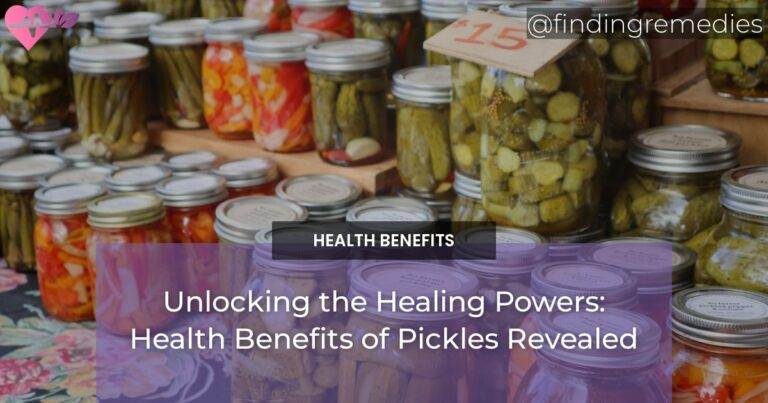Health Benefits of Pickles: Foods as Medicine
When it comes to healthy food choices, pickles are often not the first food that comes to mind. However, fermented pickles offer an array of health benefits that make them a worthwhile addition to any diet. In this article, we’ll explore the nutrition profile, natural compounds, health benefits, effects of cooking and proper storage, risk factors, healing diseases and improving health, varieties and types, and disadvantages and advantages of pickles.
Fermented Pickles
Nutrition Profile
Pickles are low in calories and high in vitamin K, an essential nutrient for bone health. They are also a good source of vitamin C, potassium, and fiber. Additionally, fermented pickles contain probiotics, which are beneficial bacteria that promote gut health and digestion.
Natural Compounds
Fermented pickles contain a variety of natural compounds, such as antioxidants and organic acids. Antioxidants help protect against cellular damage, while organic acids, such as vinegar, can improve digestion and metabolism.
ALSO READ
Health Benefits
- Probiotics in fermented pickles can improve gut health and digestion
- Antioxidants in pickles can help reduce inflammation and prevent chronic diseases
- The electrolytes in pickles can help with hydration and replenishing nutrients lost during exercise
- Fermented pickles may aid in weight loss due to their low calorie content and high fiber and water content
Effects of Cooking and Proper Storage
Effects of Cooking
Cooking pickles can destroy some of the natural compounds and probiotics, reducing their health benefits. Therefore, it’s best to consume pickles raw or lightly cooked.
ALSO READ
Proper Storage
Pickles should be stored in a cool, dark place or in the refrigerator to prevent spoilage. Proper storage can help maintain their nutritional value and prevent the growth of harmful bacteria.
Risk Factors
Sodium Content
Pickles are naturally high in sodium, which can contribute to high blood pressure and other health issues. It’s important to be mindful of your sodium intake and consume pickles in moderation.
High Sugar Content
Some pickles may contain added sugar, which can contribute to weight gain and other health issues. It’s important to read labels and choose pickles with minimal added sugars.
Presence of Artificial Preservatives
Some commercial pickles may contain artificial preservatives, which can be harmful to your health. It’s best to choose natural or homemade pickles whenever possible.
Healing Diseases and Improving Health
Digestive Health
The probiotics in fermented pickles can promote the growth of beneficial gut bacteria and improve digestion. Additionally, the natural acids in pickles can help alleviate digestive issues, such as bloating and constipation.
Immune System
The probiotics and antioxidants in pickles can help boost the immune system and protect against infections and diseases.
Bone Health
The vitamin K and calcium in pickles can contribute to strong bones and may help prevent osteoporosis.
Cancer Prevention
The antioxidants and natural compounds in pickles may help prevent the growth of cancer cells and reduce the risk of certain types of cancer.
Varieties and Types
Classic Pickles
Classic pickles are made from cucumbers and are often pickled with vinegar and spices. They can be enjoyed as a snack or as a condiment for sandwiches and burgers.
Kimchi
Kimchi is a traditional Korean dish made from fermented cabbage and other vegetables, such as radishes and onions. It is often seasoned with ginger, garlic, and chili peppers and can be eaten as a side dish or used as a topping for rice bowls and salads.
Sauerkraut
Sauerkraut is a German dish made from fermented cabbage. It is often seasoned with caraway seeds and can be eaten as a side dish or used as a topping for hot dogs and sandwiches.
Pickled Vegetables
Other vegetables, such as carrots, beets, and peppers, can also be pickled and enjoyed as a snack or used as a condiment.
Other Fermented Foods
Fermented foods, such as kefir, yogurt, and kombucha, also contain probiotics and offer similar health benefits to pickles.
Are the Health Benefits of Kefir Similar to Those of Pickles?
Yes, the health benefits of kefir are similar to those of pickles. Both are fermented foods that contain beneficial probiotics for gut health. They also provide important nutrients like vitamins and minerals. Incorporating kefir and pickles into your diet can support digestion and overall well-being.
Disadvantages and Advantages
Advantages
- Pickles offer an array of health benefits, such as improved digestion, immune function, and bone health
- Fermented pickles contain probiotics, which promote gut health and contribute to overall wellness
- Pickles are a low calorie snack that can aid in weight loss and hydration
Disadvantages
- Some pickles may contain high levels of sodium, which can contribute to health issues
- Commercial pickles may contain artificial preservatives, which can be harmful to your health
- Some pickles may contain added sugars, which can contribute to weight gain and other health issues
By consuming pickles and other fermented foods, you can improve your overall health and prevent various diseases. It’s important to be mindful of risk factors, such as sodium content and artificial preservatives, and choose natural and homemade options whenever possible. Exploring the different types and varieties of pickles can offer a variety of nutritional benefits and add flavor and variety to your diet.

